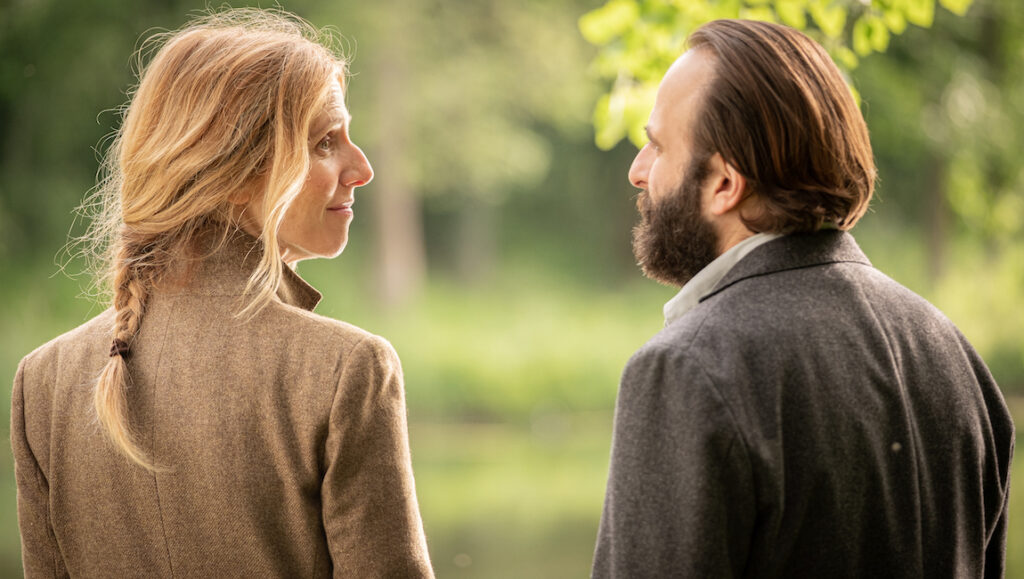If one were to point to a contemporary French filmmaker who has most consistently tried to redefine the rom-com genre’s infrastructures within the broader constraints of European arthouse cinema, perhaps no one would be a better choice than Emmanuel Mouret. While combining the friendlier, more familiar patterns of the Americans (such as Woody Allen) with a relatively more sophisticated design and mood of a specifically French tradition — say, in the comedies of Philippe de Broca or Sacha Guitry — Mouret is always able to shape a unique style that centers around the problematic relationship between fidelity and infidelity, sensual love and sexual passion. His most recent effort, Diary of a Fleeting Affair, embodies a similar attitude and aesthetic. Right from the beginning, without delivering any specificity as to the backgrounds of his leading pair, Mouret throws us into the middle of their relationship: Simon (Vincent Macaigne; a married man) and Charlotte (Sandrine Kiberlain; a single mother) initially meet at a local bar. Then, as the title foreshadows and various on-screen cards marking the passage of time enforce, Mouret focuses our attention on the various situations and moral conditions, both comic and heartfelt, that the couple face during their relatively brief liaisons which gradually evolve from the merely sexual to a more complicated emotional bond.
The flair and flavor of Mouret’s slick style in Diary of a Fleeting Affair is exactly what he’s been refining for almost two decades, transforming even the most abstract and almost implausible scenarios into convincing streams of events without ever slightly skewing toward an openly naturalistic approach. Through various modes of verbal and bodily expressions, concise framings, heightened spatial awareness, brisk music scores, and an easygoing chemistry between Kiberlain and Macaigne, who prove convincing in their roles of an incompatible couple — Charlotte as an amiable, open-minded, and playful extrovert to Simon’s mostly anxious, awkward introvert, physically defined by his usually dwindled posture (viewed best during a teasing threesome scene) — Mouret delivers both a jovial and surgical inspection of the moral and philosophical dilemmas inherent to modern affairs —especially those of the middle-aged — in bittersweet dramedy form.
The director’s formal strategy in designing his mise-en-scène also plays a crucial part in placing the viewers in the unbiased position of observer, specifically when his camera straddles an intentional distance from events (usually through arranging frame-in-frame compositions via doorways) or when he ventures into the non-diegetic, tinkering with comedic tropes of presence and absence, seen and unseen (an emblematic example: Charlotte and Simon talk behind closed doors in a dressing-room and a stranger approaches, overhearing their funny conversation without the couple being aware of her presence). The singularly quirky (and surely very French) quality of Diary of a Fleeting Affair should, however, still most fully resides in the peculiar conversations themselves that Simon and Charlotte engage in throughout. What prompts great amusement in this fleeting affair is the direct and sincere outspokenness of what they say to each other; in fact, they never try to conceal anything, neither out of personal caution nor out of social calculation, and this accords their conversations an unexpected, even uncanny pleasantness. Diary of a Fleeting Affair, then, could be considered Mouret’s most tender, modestly scaled film — for the most part, Kiberlain and Macaigne are the only people who are to remain present on the screen — one which attests to the power of sincerity rather than hefty thematizing in its construction of thoughtful, authentic dramedy.
Published as part of Cannes Film Festival 2022 — Dispatch 4.


Comments are closed.